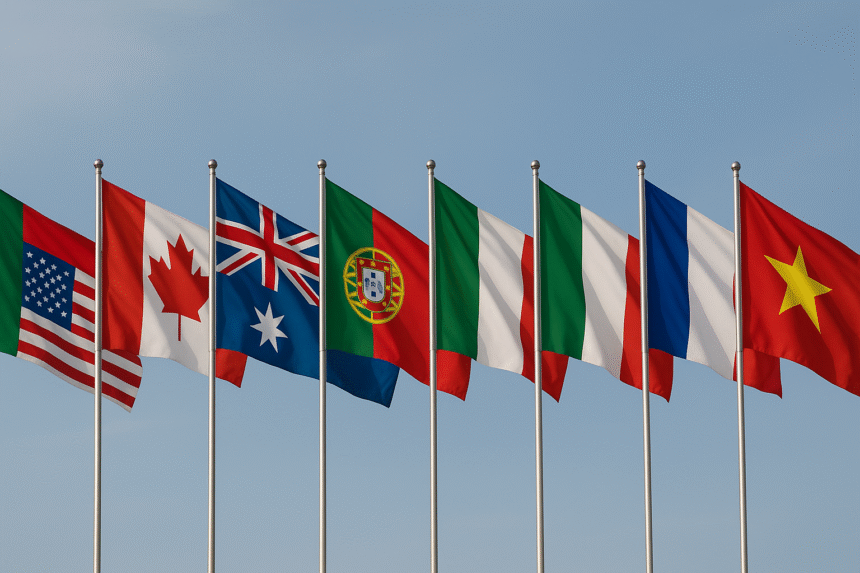Golden Visas are evolving fast—from Portugal’s policy shift to the UAE’s merit-based model. For Indians exploring global mobility, this 2025 guide compares the top 10 Golden Visa destinations, uncovering real costs, eligibility, and long-term benefits.
In a world reshaped by remote work, geopolitical shifts, and flexible citizenship policies, Golden Visas have become more than a status symbol. For many Indian professionals, retirees, and entrepreneurs, they now represent practical exit routes or global expansion platforms. But behind the glossy brochures lies a complex ecosystem of eligibility thresholds, financial traps, and lifestyle trade-offs.
Here’s a research-backed, country-by-country analysis of top Golden Visa destinations as of July 2025, from the UAE’s trending residency promise to Portugal’s policy pivot.
1. United Arab Emirates (UAE): Nomination-Based Golden Visa
Once marketed as a Rs 23-lakh “lifetime” residency, the UAE Golden Visa has since clarified its terms. As of mid-2025, it is strictly a 5-to-10-year renewable residency based on professional merit and societal contribution, not just cash.
- Cost: AED 100,000 (~INR 23.3 lakh) service fee (if nominated)
- Ideal For: Tech leaders, scientists, creatives, PhD holders
- Reality Check: No guaranteed approval. Requires endorsement by a government entity or ministry.
2. United States (EB-5 Visa)
America’s flagship investor visa still stands at $800,000 minimum in a Targeted Employment Area (TEA).
- Cost: $800,000 + ~$70,000 in legal and admin fees
- Ideal For: Entrepreneurs and HNIs seeking Green Cards
- Processing Time: 18–36 months; backlogs for Indian nationals persist
3. New Zealand (Active Investor Plus Visa)
New Zealand has tightened access. It now favors high-end investors who bring in capital and hands-on business involvement.
- Cost: NZD 5–10 million (~INR 2.5–5 crore)
- Ideal For: Seasoned businesspeople aiming for long-term residency
- Caveat: Points-based system; passive investing no longer enough
4. Canada (Start-Up Visa)
This isn’t a pay-and-stay model. You need a viable business idea backed by a designated investor or incubator.
- Cost: CAD 215k–275k (startup and support)
- Ideal For: Founders with global vision
- Residency: Direct path to PR for the whole family
5. Singapore (Global Investor Programme)
Always elite, Singapore’s GIP remains inaccessible to most.
- Cost: SGD 10–50 million
- Ideal For: Ultra-high-net-worth individuals expanding Asian businesses
- Bonus: Fast-track to Permanent Residency
6. Portugal (Post-Real Estate Golden Visa)
Portugal axed its real estate option in 2023, pivoting to innovation-focused investments.
- Cost: €500k in funds, job-creating ventures, or R&D
- Alternative: D7 Passive Income Visa (~€705/month income)
- Outcome: Schengen access + EU citizenship in 5 years with language test
7. Greece (Golden Visa)
One of the last EU nations allowing real estate-based Golden Visas.
- Cost: €250k (€400–800k in popular zones)
- Stay Requirement: None
- Citizenship Path: 7 years of continuous legal residence
8. Italy (Investor & Elective Residency Visa)
Italy’s two-tier model allows for both active investment and passive income residency.
- Investor Visa: €250k+ in startups or government bonds
- Elective Residency: €31,000+/year in passive income
- Note: Doesn’t permit immediate employment
9. France (Visitor Visa for Financially Independent Persons)
There is no traditional golden visa, but France welcomes passive income residents.
- Requirement: Proof of €1,200+/month, health insurance, and lodging
- Limitation: No direct investment path to residency or citizenship
10. Latvia (Business-Based Residency)
Latvia remains one of Europe’s most affordable options.
- Cost: ~€70,000 in company capital + state fees
- Stay Requirement: Minimal
- Residency: Renewable; citizenship possible in 10 years
Emerging Destinations to Watch in 2025
- Vietnam: Proposing a 5–10-year Golden Visa for professionals and investors. Aimed at boosting regional hubs like Phu Quoc and HCM City.
- Malta: Still running its Citizenship by Investment Program (~€750,000+), though EU scrutiny has increased.
- Spain: Considering reforms post-2023 real estate concerns. Watch this space.
What Indian Applicants Need to Know
- Dual Citizenship: India prohibits it. A foreign passport requires surrendering Indian citizenship.
- Tax Residency: Some programs (e.g., D7, France) require physical presence triggering global tax obligations.
- Due Diligence: Many nations vet source of funds rigorously. Transparency is critical.
Golden Visas are not shortcuts. They’re tools—often expensive and bureaucratic—but powerful when aligned with clear goals: better education, healthcare, mobility, or business.
For serious applicants, success lies not in finding the cheapest visa but in choosing the one that fits their purpose, and preparing accordingly.
Which of these visas appeals most to you, and why? Let us know your questions and we’ll help break down the process in our upcoming guides.







